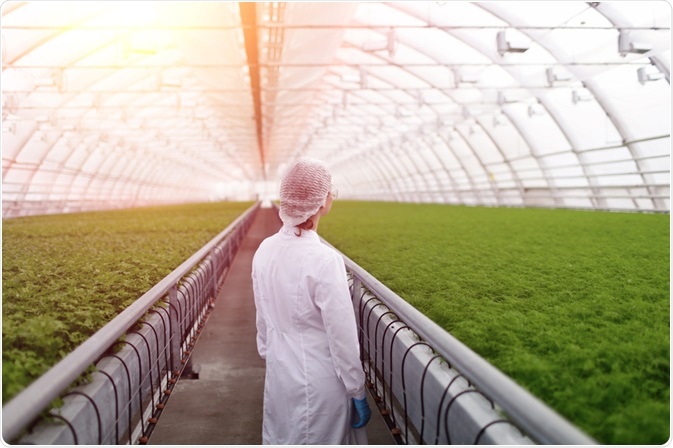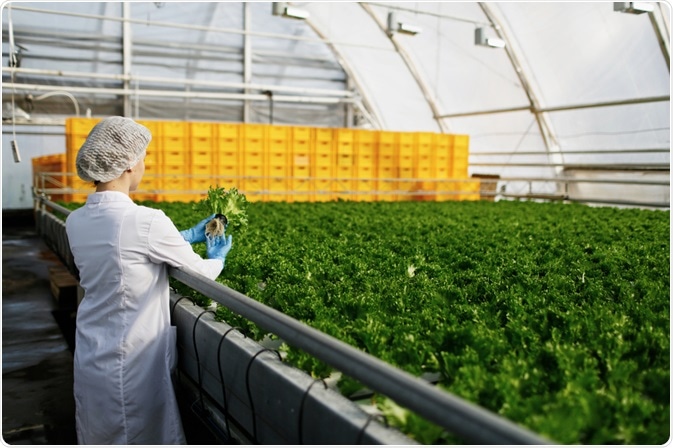In response to a rapidly growing global population, the progress of agricultural science has gained considerable attention over the past century particularly in regards to issues of food security. However, despite technological advances, many emerging issues are now challenging the future prospects of agricultural science.

Agricultural Science. Image Credit: WAYHOME studio/Shutterstock.com
The origins and importance of science in agriculture
Since the dawn of human civilization, agricultural practices are recognized to play a fundamental role in growing civilizations and developing nations. Agriculture is a pivotal development in human evolution and theorized to be one of the major turning points in transitioning from nomadic to settler lifestyles. As populations grew, agricultural practices were increasingly refined to accommodate the greater needs for food security.
By the first half of the 19th century, scientists had formed an extensive knowledge base of agricultural practices and were experimenting with tools and resources to improve crop yield, diversity, and resilience. Scientists in Germany had begun experimenting with fertilizers whereas British scientists were studying elements of agronomy, with some experiments still running to this day. By the start of the 20th century, the discipline of agricultural science was burgeoning rapidly.
Similar to other scientific procedures, a process of experimentation can be identified throughout the history of agricultural science that incorporates a treatment, a hypothesized process or causal mechanism to be tested, and an end product addressing the treatment. This process allows agricultural scientists to document and improve farming practices when facing multi-faceted challenges including social, economic, and ecological issues.
Agriculture and it's Importance
Early divergences regarding agricultural science
Interestingly, the early development of agricultural science at the onset of the 20th century was not widely accepted. Research conducted by the Dutch scientist Harro Matt from 2011 outlined key case studies of agricultural science history and described how early agricultural science was met with little confidence from stakeholders.
In particular, farmers perceived agricultural experiments to have little validity in the application and development of farming practices.
However, Matt argues that in actuality, farmers experiment frequently in a similar way to the experiments of agricultural scientists. Indeed, farmers tend to trial with different crops, fertilizers, and agricultural design to best suit changes across seasons or in response to consumer demand.
The similarities between farming and scientific experiments eventually improved the progress of agricultural science as findings were increasingly relevant to addressing challenges for farmers. Matt explained that this was due to the consistent efforts to improve communication methods with farmers through the use of agricultural advisors or extension officers that communicate scientific findings. These roles were focused primarily on communication and are crucial actors in bringing science and practice together, a practice that should be modeled across scientific disciplines.
Research goals in agricultural science
The broad objectives of agricultural science are to improve crop production to benefit farmers, consumers, and increasingly to reduce potential environmental impacts. Studies, therefore, focus generally on crop development, resilience, quality, reproduction, and their relationship with the surrounding environment. Although this sounds straightforward, contemporary agricultural science now encompasses many disciplines that overlap with other scientific disciplines.
Modern agricultural science has branched into disciplines that incorporate a considerable range of methods and techniques from molecular tools used for gene editing to the free-air CO2 enhancement studies of agroforestry. By using increasingly refined procedures to study treatments across biological levels of the organization as well as spatiotemporal scales, agricultural science has emerged as a major scientific field combining a multitude of interdisciplinary findings.
Present and future challenges for agricultural science in a rapidly changing world
Despite its rich and rapidly progressing history, contemporary agricultural science is at a turning point. Growing pressure from environmental change, habitat degradation, and socioeconomic changes are just some of the challenges that agricultural research faces in the foreseeable future.
An increasingly important challenge to address is the complex relationship between agriculture and the environment. In a study from 2017, Michael Clark and David Tilman highlighted the urgency to address some of the environmental impacts of agriculture. The researchers conducted a meta-analysis of over 700 agricultural systems to examine the associations between input and output resource efficiency of systems and their respective amounts of greenhouse gas emissions.
Unsurprisingly, findings demonstrated that plant-based crops had the lowest impacts which contrasted to ruminant-based meat systems that produced nearly 100 times the impacts of plant-based systems, further supporting the environmental value of incremental dietary shifts towards less meat-based foods.
Although dietary shifts are gaining momentum, scientists are also pushing for an increased awareness of the value of conservation alongside agricultural systems, which can encompass considerable complexity. This was particularly well summarised in a 2016 study by American and Canadian researchers that attempted to answer the question of how much conservation is enough.
The study system was the Great Lakes of North America, and researchers assembled a comprehensive analysis of necessary conservation strategies, presenting the complexities of conserving such large-scale yet ecologically valuable spaces.
Addressing issues such as environmental impacts and conservation may be beneficial, but elements of existing practices also require changing, such as the concept of organic farming. This was particularly interesting as organic food is widely considered to provide widespread benefits for consumers, farmers, and the environment alike.
Despite the widespread belief and perceived benefits of organic foods, the study led by Andrew McGuire from 2017 explains how the ideology of organic farming may be limiting the progress of agricultural science and represents a considerable issue that needs addressing. Specifically, organic farming bans all rates and uses of nearly every synthetic fertilizer and pesticide in an attempt to limit environmental damage despite any beneficial uses, which may allow the spread of pests and pathogens to vulnerable crops.
These findings were echoed in the aforementioned meta-analysis by Clark and Tilman, who highlighted that organic systems require the most land per unit of food, cause the most eutrophication, and interestingly, emit similar levels of greenhouse gases as conventional systems. Contrary to popular belief, organic systems may therefore generate unforeseen consequences rarely considered by the general population. Although this may be a controversial viewpoint, the debate itself is beneficial as it will ultimately progress scientific development.
Agricultural science is unquestionably undergoing exciting and radical changes to address the rising demands of growing populations and the challenges of environmental change. Accordingly, establishing and maintaining successful communication between researchers, stakeholders, and consumers is of paramount importance as outlined in the work of Harro Matt. Ultimately, the multi-faceted approaches and renewed efforts of modern agricultural science will pave the way for implementing new or improving existing policies in the hopes of having a more secure future.

Image Credit: WAYHOME studio/Shutterstock.com
References
- Clark, M., & Tilman, D. (2017). Comparative analysis of environmental impacts of agricultural production systems, agricultural input efficiency, and food choice. Environmental Research Letters, 12(6), 064016. https://doi.org/10.1088/1748-9326/aa6cd5
- Maat, H. (2011). The history and future of agricultural experiments. NJAS - Wageningen Journal of Life Sciences, 57(3–4), 187–195. https://doi.org/10.1016/j.njas.2010.11.001
- McGuire, A. M. (2017). Agricultural Science and Organic Farming: Time to Change Our Trajectory. Agricultural & Environmental Letters, 2(1), 170024. https://doi.org/10.2134/ael2017.08.0024
- Sowa, S. P., Herbert, M., Mysorekar, et al. (2016). How much conservation is enough? Defining implementation goals for healthy fish communities in agricultural rivers. Journal of Great Lakes Research, 42(6), 1302–1321. https://doi.org/10.1016/j.jglr.2016.09.011
Further Reading
Last Updated: Nov 4, 2024